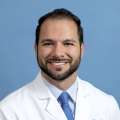Endoscopic Suturing for Weight Gain After Bariatric Surgery
Find your care
Our expert interventional endoscopy team includes skilled physicians who perform minimally invasive endoscopic procedures to treat GI disorders. Call 310-267-3636 to connect with a specialist.
Studies show that more than 90 percent of bariatric patients lose 50 percent or more of their excessive body weight and are able to maintain a long-term weight loss of 50 percent excess body weight or more. Of even greater significance, many bariatric surgery patients experience improvements in co-occurring disorders, such as the resolution of sleep apnea or improvements in hypercholesterolemia and hypertension. Some types of bariatric surgery also lead to improvements or the remission of type 2 diabetes mellitus which, prior to bariatric surgery, was thought to be a progressive and incurable disease requiring lifelong medication and lifestyle modification.
Jump start your weight loss after bariatric surgery
In recent years, published research has demonstrated that sustained weight loss can be difficult for some bariatric surgery patients, including even those who experience initial success. Most patients reach their maximum weight loss one to three years following surgery, and research shows that, on average, patients regain about 30 percent of their weight-loss after 10 years. About one-quarter of patients regain all of their lost weight by 10 years. Moreover, about 20 percent of patients who undergo bariatric surgery fail to lose significant weight - defined as less than 50 percent of excess body weight loss.
Weight regain is likely to be linked to a number of factors including:
- Over time, the pouch can expand, allowing the individual to eat more food without feeling as full and starting an insidious process of weight gain.
- The stoma can also stretch.
- A fistula can form in the connection between the pouch and rest of stomach. This is an abnormal pathway that is created with when the smaller stomach pouch grows and reconnects to the bypassed stomach. It occurs in 1 to 2 percent of patients.
- The patient's diet and exercise habits change. For example, consumption of high-calorie drinks is often the cause of gradual weight gain.
Many bypass patients who regain weight are mystified, frustrated and plagued by feelings of failure. Bariatric surgeons rarely recommend a second bypass surgery due to the increased risks associated with a repeat surgery. Primary care doctors may feel they have run out of solutions to help these patients.
Transoral outlet reduction (TORe), or endoscopic suturing for bariatric revision, provides an additional option to help these patients jump start the weight-loss process. The non-invasive procedure involves insertion of an endoscope through the mouth (under monitored anesthesia) and assesses the stomach and intestines. If the pouch and/or stoma has been stretched, sutures can be placed to reduce the pouch size and opening. The result is a retightened structure that prompts renewed feelings of satiety to curb food intake.
Important things to know about TORe
- Suitable for people who have regained weight or failed to lose significant weight following gastric bypass surgery
- Addresses enlargement of the pouch and stoma
- Requires overnight fast prior to surgery but no bowel preparation
- Typically a one-hour outpatient procedure; may require an overnight stay to treat pain or nausea
- Minimal risks, such as those associated with any endoscopic surgery
- Proven efficacy
- Requires highly restricted diet for one month following surgery along with continued lifestyle modification (diet and exercise)
Watch video to see how TORe is performed
Nutrition and counseling support
To optimize the chance of successful weight loss, prospective patients receive a consultation with a dietitian prior to surgery as well as follow-up counseling after the procedure. The patient is re-educated about the type of diet that should be followed post-surgery to avoid complications, facilitate weight loss and maintain long-term weight loss. A follow-up appointment with the surgeon is scheduled for one month after the procedure.
Frequently asked questions about TORe
- How much weight will I lose?
- About 20 to 50 pounds depending on an individual anatomy and motivation to succeed.
- Can I continue to take medications after surgery?
- Patients should avoid taking pills for the first week following surgery and opt for liquid medication where possible. Discuss your options for medication with your primary care physician and specialists prior to surgery.
- Will I need to follow a specific diet following surgery?
- Yes. Patients should adhere to a restricted diet, similar to the diet followed after the original Roux-en-Y gastric bypass surgery, for one month followed by a long-term diet that allows for the maintenance of weight loss.
- When can I return to work?
- Most patients can return to work after one day.
- Can you have this if you've had a different type of bariatric surgery, such as gastric banding?
- No. This procedure is for Roux-en-Y gastric bypass surgery patients who have regained weight due to stretching of the stomach pouch and/or stoma.
Will my health insurance cover this procedure?
We can try to submit the procedure for insurance approval, as some insurances do provide coverage for the endoscopic sleeve gastroplasty (ESG). However, many still do not. UCLA will provide an estimate of out-of-pocket costs for the procedure, appointments with the endoscopists, and nutrition team visits.
Ready to take the next step?
Phone us to learn more 310-267-3636


